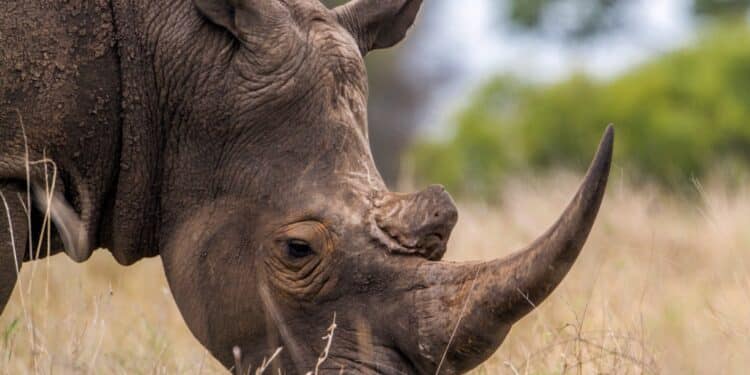Three alleged poachers were arrested on June 1 in Kruger National Park, a park in northeastern South Africa, because a tourist alerted the authorities to gunshots they heard.
According to a media statement from the park, which offers activities like safaris, hiking, hot air ballooning, the three alleged poachers are between the ages of 23 and 29 and allegedly killed four rhinoceros before being caught by field rangers.
“Reports indicate that on the said day a group of armed intruders sneaked inside the park and later gunshots were heard by a tourist who had visited the park on that day,” the statement reads.
The tourist’s information about hearing gunshots “was escalated to the field rangers and a helicopter was immediately dispatched to the scene where the sound was heard. As the chopper arrived, three men were spotted and captured in possession of a hunting rifle, a silencer, three knives, four mobile phones as well as three bags,” according to the statement. Police at Skukuza, a rest camp in the park, were notified, “and three suspects were arrested.”
Three rhino horns were found “next to the spot where the suspects were found.” Additionally, four rhinoceros carcasses were “discovered during the incident, however the horn on the fourth animal had not yet been removed when the suspects were caught.”
A preliminary investigation revealed that the alleged suspects are from Mozambique “and were in South Africa illegally hence a charge of contravention of the Immigration Act of South Africa.” The suspects were “expected to appear in the Bushbuckridge Magistrate’s Court” on July 4. They are “facing a charge of possession of unlicensed firearm with ammunition, as well as charges related to poaching and illegally entering the park.”
Lieutenant General Semakaleng Daphney Manamela, the Provincial Commissioner of the [South African Police Service] in Mpumalanga praised the field rangers’ work in the case. “We are adamant that the arrest will serve as a lesson to others that no one can just go to the park and hunt as they wish without any consequences.”
Illegal Rhino Poaching
The illegal trade for rhino horns “has soared in recent years,” according to the World Wildlife Fund (WWF). It is used in traditional Asian medicines as a purported cure for various illnesses; WWF reports that recently, individuals in Vietnam are also using rhino horns as a show of wealth.
The rhino population in the park has decreased by 60% since 2013, a 2021 update states. “According to SANParks, there are only 3,529 white rhinos and 268 black rhinos left” in the park. The update provides information about how rhino poachers are treated in the legal system: “Rangers have recently voiced their frustration to the media about the courts taking too long to prosecute alleged rhino poachers who have been arrested. Many go free on bail only to commit more acts of rhino poaching.”
Empowering Wildlife Whistleblowers Around the World
Wildlife whistleblowers are essential in disrupting wildlife crime: a previous WNN article published in commemoration of Earth Day details guest articles that all highlight the important role whistleblowers play in fighting illicit wildlife and environmental crimes.
According to the National Whistleblower Center (NWC), because of the underground and pervasive nature of wildlife crime, tracking down offenders is difficult. “Protecting and incentivizing people to report illegal activity is then crucial in combatting this increasingly lucrative trade and the poaching that sustains it,” NWC writes.
Representative Don Young (R-AK) has also recognized the importance of wildlife whistleblowers. In a September 2020 interview with WNN, Rep. Young called wildlife whistleblowers “our eyes and ears on the ground” and “invaluable partners in the fight against illegal hunting and fishing.”
Near the end of 2021, Representatives John Garamendi (D-CA) and Don Young (R-AK) “reintroduced the Wildlife Conservation and Anti-Trafficking Act (WCATA). The bill was previously introduced in 2019 and is widely supported by both whistleblower and wildlife advocacy groups,” previous WNN reporting states. The bill “includes requirements for federal agencies to implement whistleblower award programs. These programs would help recruit whistleblowers and monetarily award individuals who blow the whistle on violations of wildlife trafficking laws. Comparable whistleblower programs have revolutionized the detection and prosecution of government contract fraud, tax fraud, and securities fraud.”
WCATA would also redesignate “wildlife trafficking as an offense under federal racketeering and organized crime statutes. The bill also expands conservation funding, as monies recovered by successful prosecutions under wildlife laws would be put directly into conservation efforts.”
Read the media statement on Twitter here.
Read more wildlife and environmental whistleblower news on WNN.


